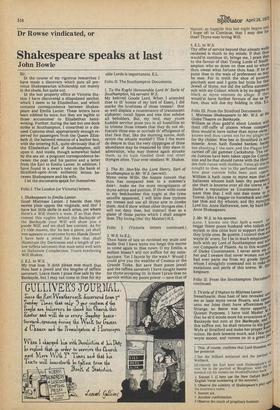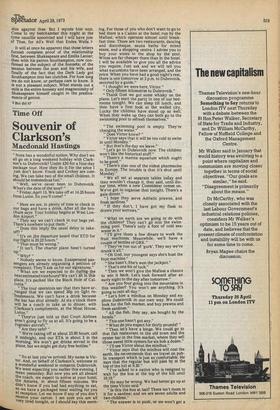Sir,
In the course of my rigorous researches I have made a discovery which puts all previous Shakespearian scholarship not merely in the shade, but quite out.
In the lost property office at Victoria Station I have discovered a dilapidated satchel, which I deem to be Elizabethan, and which contains correspondence between Shakespeare and Emilia Lanier. These letters have been nibbled by mice; but they are legible to those accustomed to Elizabethan handwriting. Further, during the last but one dock strike at Southampton, I unearthed in a disused Customs shed, appropriately enough reserved for passengers from the Queen Elizabeth II, the battered remains of a leather box, ,
with the lettering H.S., quite obviously that of the Elizabethan Earl of Southampton, still upon it. And inside, though somewhat faded by the sea air, a poignant correspondence between the poet and his patron and a letter from the Earl to Emilia Lanier. In addition, I have found in a swan's nest on the bank at Stratford-upon-Avon authentic letters between Shakespeare and his wife.
I let the documents speak for themselves.
Folio I: The London (or Victoria) letters.
1. Shakespeare to Emilia Lanier. Good Mistresse Lanier. I hearde thee this morne plaie uppon the virginals, and tho' I have but little skille in such artes, yet where there's a Will there's a wale, If so that thou comest this nyghte behind the Backsyde of the Banksyde your Will will show you a goode Will, and we shall bee content. As for y'r olde manne, tho' he bee a peere, yet shall wee appeare to overcome hymn Hands Down] I have here a jewel] for thee that shall illuminate thy Darknesse and a length of yellow taffeta sarcenett that male sette well with an Italianate Complection. Youre everloving Will Shakes.
2. E.L. to W.S.
My true loue. It doth please mee much that thou hast a jewell and the lengthe of taffeta sarcenett. Leave them I praie thee safe by the Banksyde, but I may not come to thee for my olde Lorde is importunate. E.L.
Folio H: The Southampton Documents.
1. To the Ryght Honourable Lord th' Earle of Southampton, his servant W.S.
My beloved Goode Lord. When I attended thee to th' howse of my lord of Essex, I did marke the loveliness of those tresses2 that so well displaie a countenance of translucent alabaster, corall lippes and eies that subdue all beholders. But, my lord, may youre humble servitor praie you in all humillitie so to trimme those tresses that they do not obfuscate thine eies or occlude th' effulgence of that face that, like the morning sunne, doth revive the whoole worlde? 3 This I the more do desyre in that the very clyppinges of thine abundance may be treasured by they slaue in admiration, who may thenne again stroake them, as he hath fondled them and other thynges afore. Your ever obedient W. Shakes.
2. The Rt. Hon'bie the Lord Henry, Earl of Southampton to Mr. W.S. (secrett).
Myne owne Wille, the happie conceit that thou has compared mee to a summer's daie4, make me the more recognizante of thyne advice and petition. If thow wilte come to my bedchamber this nyght at the tyme usuallie appointed, I will lette thee trymme my tresses and use all thyne arte to combe them. And if thow wiliest other thynges else, I will not deny thee, but instruct thee as a plaier of those partes which I shall assigne thee. Thy loving (tho' thy Maister) H.S.
Folio I. (Victoria letters continued.)
3. W.S. to E.L.
Thou haste of late so ravished my soule and bodie that I have layne too longe this morne to come again to thee nowe. 0 my Emilia. a million kisses 5 will not suffice for my satisfactionn. Yet I faynte by the waie.6 Would I could give you the wealthe of Croesus or the Grande Turke. But save thatt poore jewell and the taffeta sarcenett I have nought meete for thyne accepting itt. Is there I praie thee no service within my poore power — save that of
Spectator
28, 1973
April Nature, so happilie this last night begun and I hope oft to Continue, that I may doe for thee? Thyne euer loving Will.
4. E.L. to W.S. Thy offer of service beyond that already welle rendered is much to my minde. If that thou would'st continue itt, bringe me, I praie thee
to the favour of that Young Lorde of Southampton who so dotes on thee and to whom
thou owest what fortune thou hast. If he so putte thee in the waie of preferment so MaY he mee. For in truth the shoe of povertle
pincheth sore and I gotte but lyttle for that Jewell of thyne, nor did the taffeta sarcenett suit with my Colour, which is by no degree s° black as myne enemies do allege. If thou would'st have further favours of me as he' fore, thou wilt doe my bidding in this. E.1
Folio III. From the Stratford Documents. „
1. Mistresse Shakespeare to Mr. W.S. at the Globe Theatre on Banksyde. William as thou gadd'st about London Wit!' thatt riff-raffe of plaiers whose compa°11 thou would'st have rather than myne oWne knowe well thou carest not for my plyght no' for thy childer. Wee bee in Strattford in We miserie: Avon hath flooded bankes; barleY
bee shootyng i' the eare, and the Plague had;
carried off old gammer Cackshutte. The vel. rie Justices have been taken uOrle for CorruP' tion and he that should runne with the H0t1 ,,a;
des doth runne with theHare. Yette all this L" nought to thee, nor to thy perfumed master'
how poor cointrie folks been putt upPni; William it hath come to myne eare that a, Italianate whoore hath been thy paramotj t she thatt is knowne over all the towne OL, Darke a reputation as Countenance.7 P:g ware thee that I will one daie come to c, Towne, lyke a beggar on horseback and OW, tise thee and thy whoore, and thy myncr; Lord too. Anne Hathawaie, now, by hard 11"'
Anne Shakespeare.
2. Mr. W.S. to his spowse. 2. Mr. W.S. to his spowse.
Anne, I knowe one that hath waie8 trd nagge thiere poore husband who toileth • myleth in this cittie butt to support thee a'71 they lyttle ones. Be quiette, I council theeall„t wayte th' event, for I be in much emploiettle.,”h both with my Lord of Southampton and Wit our Companie of Plaiers. As to this won101% of Darke Countenance, I never sette eie 0 her and I sweare that never woman nor h°1e had ever parte me from my goode spou,se whom I straightly command not to riske exalations and perils of this towne. W. Sh8 kespeare.
Folio II: From the Southampton DocuMent5 continued.
3. Th'erle of S'thpton to Mistress Lanier. Sweethearte, thou hast of late revealed tined me at laste myne owne Pouers, and open unto me Joies thatt have afforetimes heeto Strange, so Bente was myne appetite 5, Quieter Purposes. I have told Master WA,' e that he sh'd minde more his avocations at;iff Banksyde but nott at the Backs yde, anunre this suffice not, he shall returne to his P°". Wyfe at Stratford and make her proper Ile:tb tution. He doth lamente much, and I fear 0°5, wryte moore, and runnes on in a great 0,
1 This, of course, confirms that Lord Hunsdon
her protector. „ at
2 See the Hilliard miniature and the portran
Wellbeck. 5 ad'
' '
3 Evidently the Earl later took Shakespeare,-, at. vice, for in the portrait at Boughton, with tr,` tendant cat his tresses are brushed further back. 01 4 Sonnet I. (I here use the New Oxford 13031( English Verse numbering of the sonnets). „000 5 Observe the subtlety of Shakespeare's play "r his mistress's name.
6 Sonnet xix.
7 Another confirmation.
8 Observe the touch of propitiary humour. sion agaynst thee. But 1 mynde him nott. Come to my bedchamber this nyght at the tyme usuallie appointed and I will have joie of Thee, for All's Well that Endes Welle. 9
It will at once be apparent that these letters furnish complete proof of the relationship first, between Shakespeare and Emilia Lanier; then with his patron Southampton, now confirmed as the subject of the Sonnets; of the tension between the poet and his wife, and finally of the fact that the Dark Lady got Southampton into her clutches. For how long we do not know, or perhaps care to know. It is not a pleasant subject. What stands out a mile is the entire honesty and magnanimity of Shakespeare himself caught in the predicaments of genius.
9 But did it?



































 Previous page
Previous page